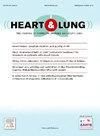您的病人需要植入式心脏除颤器吗?
IF 2.4
4区 医学
Q2 CARDIAC & CARDIOVASCULAR SYSTEMS
引用次数: 0
摘要
背景心力衰竭患者面临室性心律失常的风险。植入式心脏除颤器(ICD)可显著减少心脏性猝死。遗憾的是,ICD 的植入往往未得到充分利用。根据研究,美国心脏病学会和美国心脏协会建议射血分数(EF)低下和心力衰竭的患者使用 ICD。哈肯萨克大学医疗中心的心衰协调员对入院的心衰患者进行了筛查。通过实时筛查和参与多学科查房(MDRs),我们查看了患者的超声心动图,以确定射血分数(EF)为 < _35%,纽约心脏协会(NYHA)分级为 I-III 级,并确保患者接受了至少 3 个月的最佳药物治疗。患有绝症、预期寿命、认知障碍或严重精神疾病的患者不包括在内。如果患者符合标准,将向医疗服务提供者发出建议,请其咨询电生理学 (EP)。此外,我们还修改了心力衰竭算法,建议 EF< 35% 的患者接受 EP 会诊。结果我们对《Get With The Guidelines- Heart Failure》(GWTG-HF)质量衡量标准 AHAHF12 "出院时放置或开具 ICD 咨询或 ICD "的遵守率从 203 年第 1 季度到 2023 年第 2 季度提高了 20%,第 3 季度又提高了 7%。通过日常筛查和使用心力衰竭算法,我们发现了一些病例,并在每月的心力衰竭裁定会议上进行了介绍。这些介绍不仅有助于向 EP 转诊,还吸引了我们的听众。结论使用日常筛查增加了电生理学的转诊率,并确定了符合设备治疗标准的患者。考虑植入 ICD 必须是一个共同决策的过程。随着心力衰竭患者的不断增加,设备治疗可以提高患者的总体生存率。了解能够完善复杂心衰护理管理的技术和设备至关重要。本文章由计算机程序翻译,如有差异,请以英文原文为准。
Does Your Patient Need An Implanted Cardiac Defibrillator?
Purpose
The purpose of this Quality Improvement Project was to identify heart failure patients who met criteria for an Implanted Cardiac Defibrillator.
Background
Patients with heart failure are at risk of ventricular arrhythmias. Implantable cardiac defibrillators (ICDs) can significantly reduce sudden cardiac death. Unfortunately, ICD implantation is often underutilized. Based on studies, the American College of Cardiology and American Heart Association recommend ICDs in patients with depressed Ejection Fractions (EF) and heart failure. The Centers for Medicare & Medicaid Services have approved reimbursement for ICD placement in patients meeting criteria.
Methods
The Heart Failure Coordinators at Hackensack University Medical Center screened heart failure patients admitted to the hospital. Through real time screening and participation in Multidisciplinary Rounds (MDRs) we reviewed patients echocardiograms for ejection fractions (EF) of < _35%, New York Heart Association (NYHA) class I-III and ensured the patient had received optimal medical therapy for at least 3 months. Those with a terminal illness, life expectancy, cognitive or severe psychiatric illness were not included. If patients met criteria a recommendation was sent to the provider for a possible consultation to Electrophysiology (EP). Additionally, the Heart Failure Algorithm was modified to suggest EP consults for patients with EF< 35%.
Results
Improvements in our compliance to the Get With The Guidelines- Heart Failure (GWTG-HF) Quality Measure AHAHF12: ICD Counseling or ICD Placed or Prescribed at Discharge increased by 20% from Quarter 1 203 to Quarter 2 2023 and additionally increased by 7% in Quarter 3. Through daily screening and the use of the Heart Failure Algorithm, cases were identified and presented at our monthly Heart Failure Adjudication meetings. These presentations not only assisted in referrals to EP, but also captured our audience. The presentations increased the awareness of our medical centers providers.
Conclusion
The use of daily screening increased referrals to Electrophysiology and identification of patients that met criteria for for device therapy. Consideration of ICD implantation must be a shared decision making process. As the population for heart failure continues to grow, device therapy can improve overall survival. It is vital to remain aware of technologies and devices that can refine management of complexed heart failure care.
求助全文
通过发布文献求助,成功后即可免费获取论文全文。
去求助
来源期刊

Heart & Lung
医学-呼吸系统
CiteScore
4.60
自引率
3.60%
发文量
184
审稿时长
35 days
期刊介绍:
Heart & Lung: The Journal of Cardiopulmonary and Acute Care, the official publication of The American Association of Heart Failure Nurses, presents original, peer-reviewed articles on techniques, advances, investigations, and observations related to the care of patients with acute and critical illness and patients with chronic cardiac or pulmonary disorders.
The Journal''s acute care articles focus on the care of hospitalized patients, including those in the critical and acute care settings. Because most patients who are hospitalized in acute and critical care settings have chronic conditions, we are also interested in the chronically critically ill, the care of patients with chronic cardiopulmonary disorders, their rehabilitation, and disease prevention. The Journal''s heart failure articles focus on all aspects of the care of patients with this condition. Manuscripts that are relevant to populations across the human lifespan are welcome.
 求助内容:
求助内容: 应助结果提醒方式:
应助结果提醒方式:


